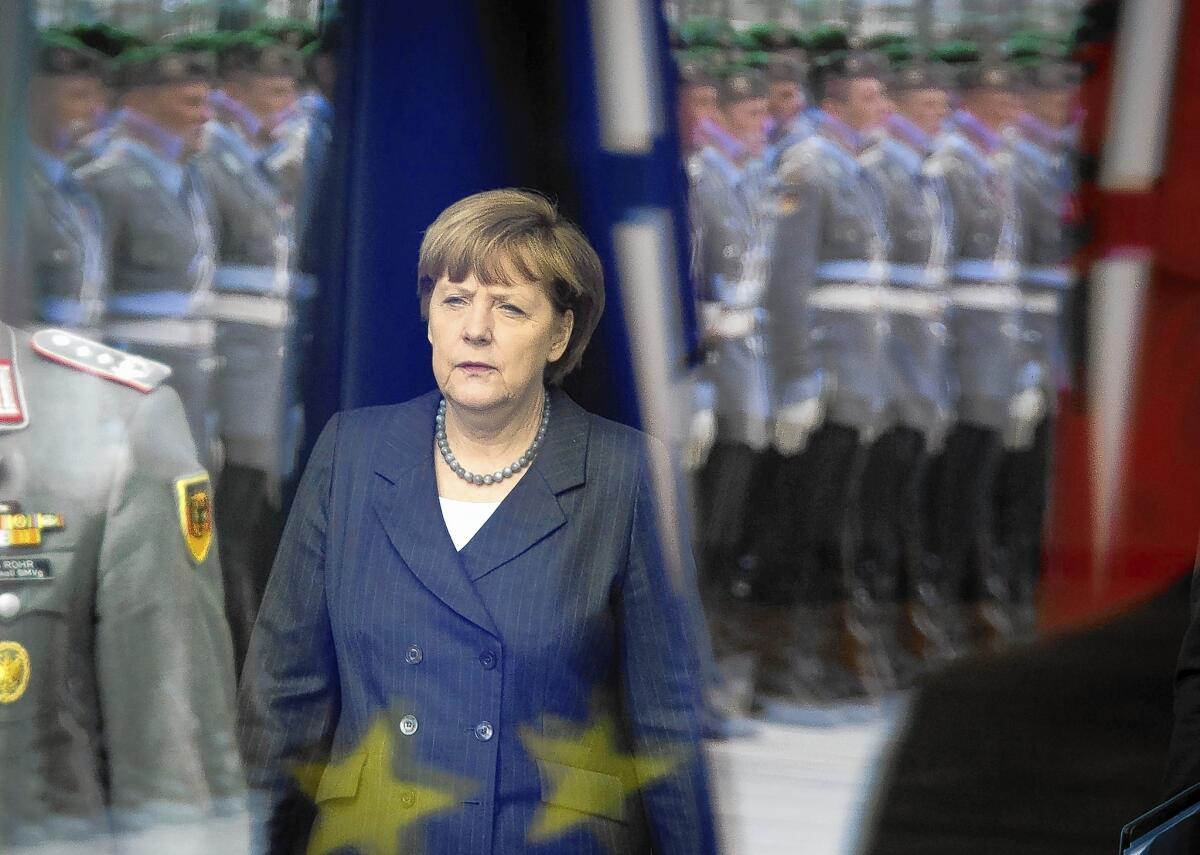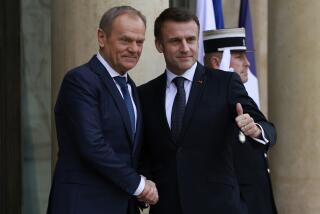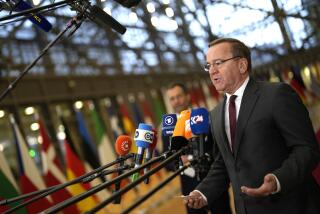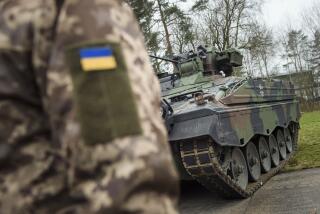Crimea crisis highlights Germany’s aversion to being in the vanguard

LONDON — It was a German-born Russian empress, Catherine the Great, who first annexed Crimea more than two centuries ago. Can another strong-willed German woman — who keeps a portrait of Catherine in her Berlin office as a symbol of visionary leadership — loosen Russia’s renewed grip on the peninsula?
Many in the West are pinning their hopes on Angela Merkel, Germany’s long-serving chancellor, to stand at the forefront of a potent, united response by Europe to Russia’s seizure of Crimea from Ukraine. Alongside fellow European officials, Merkel has categorically condemned the takeover and warned Moscow of the consequences, including possible economic sanctions.
Whether she feels comfortable as the conductor rather than just singing in the chorus, however, isn’t as clear.
To take the lead would be something of a leap for the normally cautious Merkel and for the country she heads, which has studiously shunned a front-line role in European foreign policy since its disastrous history at the center of two world wars.
Voices from outside Germany and some in Merkel’s own party are urging her to adopt a more muscular foreign policy, commensurate with Germany’s status as Europe’s biggest, most powerful economy. Such a shift has been under discussion in Berlin the last few years, but advocates say the crisis in Crimea has brought the matter to a head.
“Germany has to get used to really pursuing foreign policy as a player,” said Norbert Roettgen, chairman of the German parliament’s foreign affairs committee and a member of Merkel’s Christian Democratic Union.
The nation’s economic might has created a growing “expectation from our friends and neighbors that we live up to our responsibility,” Roettgen said. “A leading role is upon Germany if we like it or not.”
Plenty of people don’t, especially those in German business circles who are worried about jeopardizing relations with Russia, an important trading partner and provider of as much as one-third of Germany’s oil and gas. Most of Merkel’s compatriots tell pollsters that they oppose sanctions on Moscow, at least for now.
Since Russia’s incursion into Crimea in late February, Merkel has diligently worked the phones to broker a diplomatic solution. She has been in direct contact with Russian President Vladimir Putin more than has any other world leader.
Although the two aren’t said to enjoy a deep rapport, they literally speak each other’s language: Merkel is fluent in Russian, having grown up in the shadow of the Soviet Union, and Putin learned German during his assignment in East Germany as a KGB officer.
Yet her efforts to persuade him to pull back from Crimea and refrain from formally annexing it ultimately proved no more fruitful than the demands from President Obama and other Western leaders.
“You cannot expect that by one, two, five or 10 telephone calls by Angela Merkel, [Putin] comes to a better understanding and says, ‘Oh, OK, now I understand that I made a mistake,’” Roettgen said. “What she can bring … is to have real contact with him, not only to talk, but to have a kind of mutual understanding. They know each other. Both have lived in East Germany, she for decades, he for years.”
It’s that personal experience, of an East Germany under the thumb of Moscow during the Cold War, that has informed much of Merkel’s response.
Last month, in a tough speech in the parliament, she lambasted Moscow for applying the “law of the jungle” and reiterated the threat of economic penalties by the European Union if tension escalates, meaning if Russian forces cross into eastern Ukraine.
Yet Merkel is also finely attuned to popular opinion at home, enough that critics accuse her of habitually acting less from conviction than from waiting to see which way the wind is blowing.
Although EU countries such as Britain and Poland have pushed for a more aggressive answer to Putin, others have held back, most significantly Germany, where a majority of residents oppose a potentially costly political and economic standoff. With Merkel’s blessing, the EU settled on a graduated approach to punishing Moscow, reserving economic sanctions as a last resort.
“She’s never really in front,” said Stefan Meister, a senior fellow with the European Council on Foreign Relations in Berlin. “She has experienced that waiting, not stepping forward … brings her more benefits. And this is how German society thinks; it’s very conservative. They don’t want German leadership. They don’t want to pay money for Ukraine.”
There are calls for Berlin to shake off its perceived passivity in foreign affairs.
Three years ago, Germany abstained from a United Nations vote on intervening in Libya, choosing to sit on the sidelines while Britain and France led the effort to impose a no-fly zone over the country during the uprising against dictator Moammar Kadafi. Berlin’s opt-out dismayed many of its allies and some of its own politicians, and fueled a growing debate over whether Germany ought to finally shed its post-Nazi-era inhibition on flexing its muscles in foreign policy.
Before the Crimean crisis erupted, important German political figures — including President Joachim Gauck, Foreign Minister Frank-Walter Steinmeier and Defense Minister Ursula von der Leyen — came out in favor of a more active foreign policy.
Merkel has remained mum.
“There are people in her own party pushing her. Von der Leyen is a close ally,” Meister said. “The environment is there.”
Some analysts say they already detect a more energetic, high-profile approach. Steinmeier was one of three foreign diplomats — the others were from France and Poland — who flew to Ukraine in February to negotiate a deal between President Viktor Yanukovich and the protesters seeking to oust him. Yanukovich, a Moscow ally, later fled the country, prompting Russia’s move into Crimea.
“Is Germany willing to lead? Yes. But it prefers to lead with others,” said Philip Murphy, the U.S. ambassador in Berlin from 2009 to 2013. “Germany likes to be in a club. They like the G-7, they like NATO, they like the EU.”
Murphy believes that many people mistake for caution Merkel’s attempts to build consensus and solve problems. If Western sanctions or other unpopular measures become necessary to deal with Russia, he predicts, she’ll step up to the plate.
“Merkel is tough-minded. She will make sure that she has Germany’s interests in mind,” Murphy said. “But she will be on the right side of history.”
More to Read
Start your day right
Sign up for Essential California for news, features and recommendations from the L.A. Times and beyond in your inbox six days a week.
You may occasionally receive promotional content from the Los Angeles Times.







